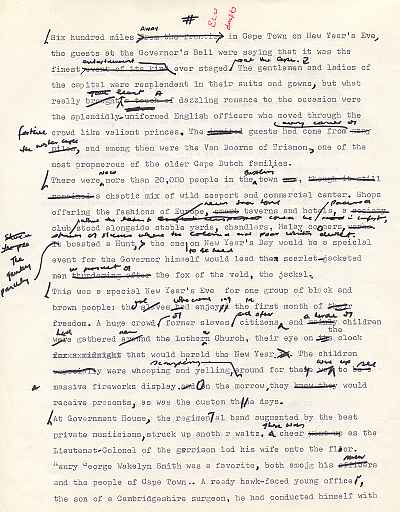The train ride into New Haven was significant this morning because I finished my rereading of Walking on Water. It will go back on the shelf for another couple of years. In the closing pages, L’Engle talked about the importance of editing and revising for an artist. Honing one’s craft does not necessarily make it easier. As you improve, you raise your standards and your goals.
As a writer struggles to grow, more and more work becomes necessary. (186)
When I was an English teacher, one of the hardest things to communicate was the importance of editing. Students would turn in their first drafts as if they were finished pieces. I remember reading someone’s account of a professor who, when she turned in a paper, would ask, “Is this your best work?” She took it to mean the professor didn’t want the paper, so she would go back and revise it. After the scene played four or five times, when he asked she said, “Yes.” He took the paper and replied, “Good. Now I’ll read it.”
These nightly offerings are not as edited as I would like, but they are not the first thing I wrote down either. Editing is what makes writing good. It’s hard work. It takes time. And it’s painful. My students in Winchester audibly groaned when I told them their essays could not be longer than seven hundred and fifty words. My point was to teach them how to revise and distill and focus. I would offer Blaise Pascal’s words:
I would have written a shorter letter, but I did not have the time.
What I wanted my students to see was there was almost always room to grow, to see new things. To read back through an essay on a different day and a different time meant to see it with different eyes. To ask someone else to read it and give feedback was an exercise in both artistic and relational growth. We can’t see it all in one trip.
L’Engle shifted her focus as she made the final turn toward home, talking about coming to terms with all we don’t know in the world. The point of our faith is not that we have The Answer, or any answers for that matter. The point of our existence is not to be in control. One of the sentences I underlined in an earlier simply said, “Love, not answers.” There is more to being human than a mere intellectual encounter with the world. She wrote,
Despite our technology there is far more that we do not know than we know. (191)
I reached into my pocket and pulled out my pen and wrote in the margin, “A revising life.” As we gain new perspectives, we need to go back, revise, and rewrite. I’m not talking about jettisoning what came before, or throwing things away. In some sense, everything matters. The faith of my childhood looks very different from the faith that feeds me today and yet there is a progression, a connection. I am deeply grateful for how I grew up; it has helped me to get to where I am now. My faith matters to me today because I have kept revising. I have let God grow up with me, if you will.
Some years ago, I read an article stating that the body of knowledge in our world doubles every five years. One article I found tonight said that doubling occurs in just twelve months; another said it will not be long before it is down to twelve hours. When I was a kid I was fascinated by the idea of a Renaissance Man—someone who could know everything about everything. During the Renaissance, it took over a century for the body of knowledge to double. A person could master a good portion of it all. Not any more. We cannot know everything. We can’t even put together a group of people who know everything.
How should we then live? As we struggle to grow, more and more work becomes necessary. To decide we know all we need to know, or that we’ll leave the task to others in forsaking our calling as human beings. In the Incarnation, God gives us an example of how we can choose to continue to grow. However we picture God, coming to earth in the form of a human was growth, a new experience—even for the Supreme Deity. If God can continue to grow and change, are we not called to go and do likewise?
As we follow the star to Bethlehem, are we doing our best work?
Peace,
Milton

I have not always done my best work, but I keep learning and (I hope) growing. Maybe we’ve reached that time of casting away stones, and we don’t need to worry so much about knowing everything – just the really important things.
Thanks, Milton. I know we only connected in Durham on a couple occasions but I so appreciate reading your reflections here. This point about the Renaissance man makes me think about pastors and how pastors are often expected to have a well-rounded buddy of knowledge–about everything. Theology, current events, budgeting, writing, community organizing, etc. This might have been more accurate in the past, but now it feels like a prescription for burnout. Or congregational disappointment. How are our expectations of Pastor shifting in ways both helpful and not helpful? Your point about revising stands out to me in relation to this question. I wonder who we can ask to help us edit and revise in our churches…I wonder if we have the humility to ask and congregations have the ability to offer such help…